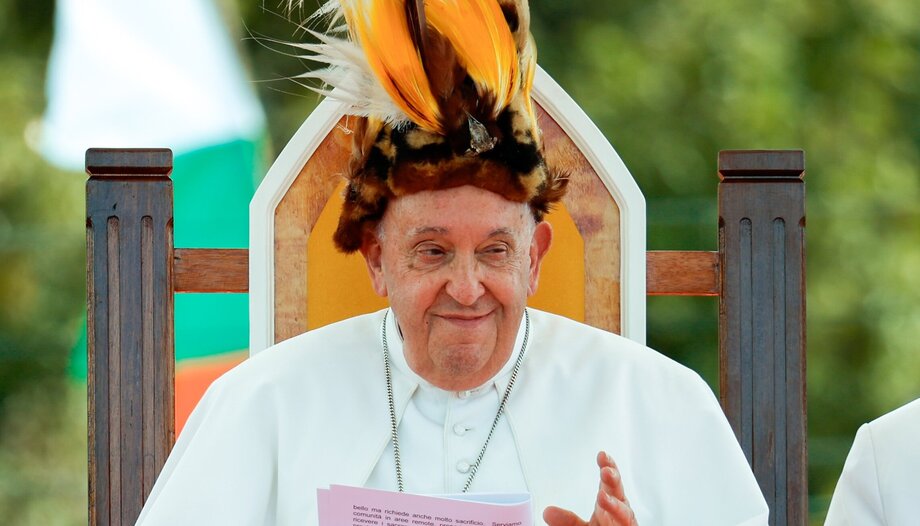The Pontiff's day in Papua New Guinea's capital, Port Moresby, began with a visit at the Nunciature to Prime Minister James Marape. Shortly thereafter he departed for Sir John Guise, a stadium packed with the faithful who awaited him with chants, especially animated when Pope Francis made his turn in an open golf cart, departing from the adjacent soccer stadium.
The Pope, looking good in a wheelchair, celebrated Holy Mass which featured prayers in English, motu and tok pisin, and various songs.
In his homily, speaking of the miracle of Jesus with the deaf-mute, he recalled that "there is an inner deafness and a mutism of the heart that depend on everything that closes us in ourselves, closes us to God and to others: selfishness, indifference, fear of taking risks and exposing ourselves, resentment, hatred and the list could go on".
The Pontiff, explaining the parable, assured that "this is the nearness of Jesus, who comes to touch our lives and remove all distance". For "as St. Paul affirms, by his coming he proclaimed peace to those who were far away".
"Jesus comes near and, like the deaf and dumb, says to us also: 'Effeta', that is, 'Open up'". And he concluded with an exhortation: "The Lord also says to you today: 'Courage, do not be afraid, Papuan people! Open up! Open yourself to the joy of the Gospel, open yourself to the encounter with God, open yourself to the love of your brothers."
After praying the Angelus, he left for the Nunciature where he had lunch and then went to Jacksons International Airport. From here, a C-130 military plane took him in just over two hours to the city of Vanimo, with 40,000 inhabitants, 30 percent of whom are Catholic.
On the esplanade in front of the Cathedral of the Holy Cross, episcopal seat of the diocese of Vanimo, some thousands of faithful welcomed him with dances and songs, to which were added the words of the bishop, the testimony of a catechist, of a little girl from the Girls' Home of Lujan, of a nun and of a family.
The Pope recalled that "since the middle of the 19th century the mission here has never ceased: religious men and women, catechists and lay missionaries have never ceased to preach the Word of God and to offer help to their brothers and sisters".
"Thus - the Pope added - churches, schools, hospitals and missionary centers bear witness all around us that Christ has come to bring salvation to all, so that each may flourish in all its beauty for the common good."
And although "we have heard how some of you, in order to do this, face long journeys, to reach even the most distant communities", he recalled that "we can also help you in another way, and that is for each of us to promote the missionary proclamation where we live, that is, at home, at school, in work environments; so that, everywhere, in the forest, in the villages or in the towns, to the beauty of the landscape corresponds the beauty of a community in which people love each other".
Therefore, he invited them to form "like a great orchestra" to be able to "expel fear, superstition and magic from people's hearts; to put an end to destructive behaviors such as violence, infidelity, exploitation, alcohol and drug consumption".
"Let us remember - concluded the Successor of Peter - that love is stronger than all this and its beauty can heal the world, because it has its roots in God.
A Golden Rose was also placed before the image of the Virgin Mary and the bishop prayed the prayer of consecration to Mary.
Shortly after, the Pontiff visited Holy Trinity Humanistic School, a Catholic school run by the parish and the Institute of the Incarnate Word. Welcomed by the missionaries and escorted to the School & Queen of Paradise Hall, Francis attended a concert by the student orchestra of the students and later had a private meeting with the missionaries.
The day concluded with a return to Port Moresby, to the Nunciature, where the Pontiff spent the night awaiting his last day in Papua New Guinea.







